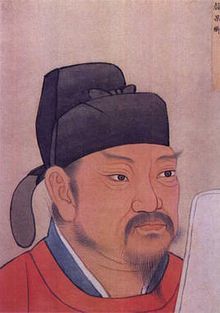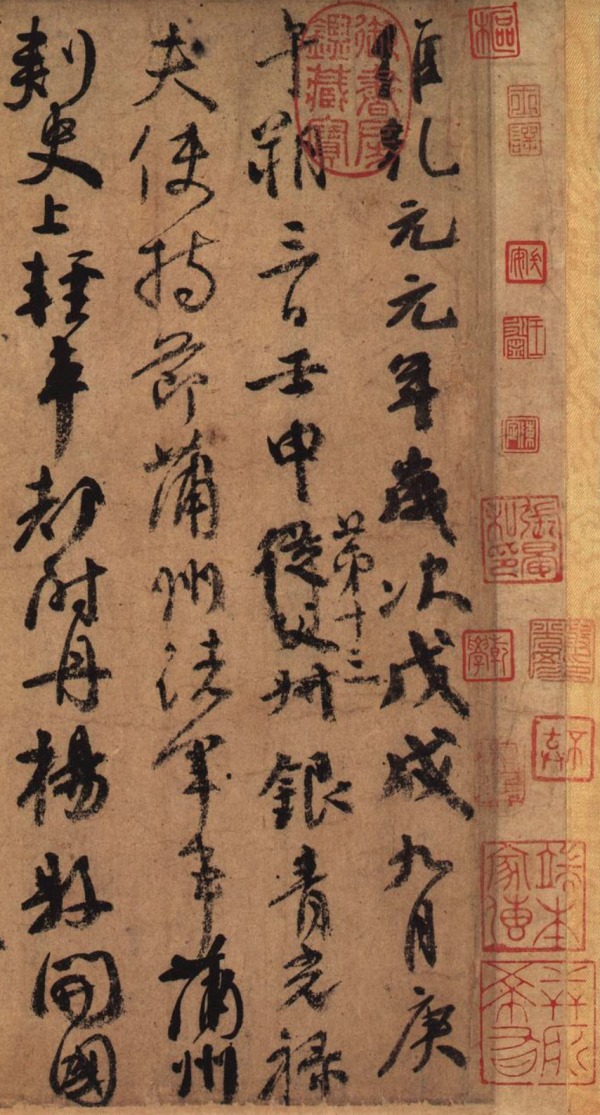
[ad_1]
Yan Zhenqing<Nephew Memorial Manuscript〉The original work is now in the collection of the National Palace Museum in Taipei. (Image source: National Palace Museum)
Surrounded by “lofty mountains, lush forests and tall bamboos”, the Orchid Pavilion is surrounded by the meandering water, and the drunken people are at the elegant banquet of celebrities.Wang XizhiWrite the best in the worldrunning script“Preface to the Lanting Collection”. So, which masterpiece earned the reputation of “the second running script in the world”?
Unexpectedly, what Que Ping selected was a “draft” that seemed to be scrawled and messy with many corrections. It was the “Manuscript for Nephew” written by Yan Zhenqing in grief and indignation to commemorate Yan Jiming, his nephew who was killed in the Anshi Rebellion. The content is loyal and true to the day. The moon is moving.
Yan Zhenqing is highly admired for his character and book quality.
Yan Zhenqing (709-785 AD), a great calligrapher of the Tang Dynasty, lost his father when he was young and was raised by his widowed mother. Because his family was poor and couldn’t afford paper and pen, he had to mix loess into mud and apply it on the wall to practice writing. Such a hard environment encouraged him to study diligently, and at the age of 25 he passed the Jinshi Scholarship. He once served as the prefect of Pingyuan and was granted the title of Duke of Lu County. He was known as Yan Pingyuan and Yan Lu Gong in the world.
Yan Zhenqing is an honest and upright person. His calligraphy is full of muscles, dignified and majestic, and he is known as the most accomplished calligrapher after the “two kings” (father and son Wang Xizhi and Wang Xianzhi). Su Shi, a great writer in the Song Dynasty, also highly praised: “Poetry is as good as Du Zimei’s, writing is as good as Han Tuizhi’s, painting is as good as Wu Daozi, and writing is as good as Yan Lugong, and the changes in ancient and modern times have made the world capable of doing everything.”
As the saying goes, “Words are like people” and “Books are paintings from the heart.” Art works reveal the author’s moral character. Yan Zhenqing was loyal to the emperor and patriotic, good at both civil and military affairs, and “the spirit of loyalty and righteousness overflowed in his strokes”. His noble character and book quality were admired by later generations. Until now, many people learn calligraphy by copying the neat “Yan Ti” regular script.
Although Wang Xizhi’s famous “Lanting Collection Preface” ranks first, its whereabouts are a mystery. When it comes to authentic writings handed down from generation to generation, Yan Zhenqing’s “Manuscript for Memorials to Nephew” is truly “the best running script in the world”. If you want to understand this impassioned work that has spanned thousands of years, you have to start with the “Anshi Rebellion”, a key historical event in the Tang Dynasty that turned from prosperity to decline.

Portrait of Yan Gaoqing in the Xun Palace of Southern Qing Dynasty. (Image source: Public domain)
During the Anshi Rebellion, Yan Gaoqing and his son tragically died for the country
In the middle and later years of Emperor Xuanzong of the Tang Dynasty, traitors and sycophants were in power and official governance was corrupt, and vassal towns took the opportunity to rise. In the fourteenth year of Tianbao (AD 755), Jiedu envoys An Lushan and Shi Siming launched a rebellion in Fan Yang (today’s Beijing) on the pretext of attacking Yang Guozhong to “clear the emperor’s side”. The counties in Hebei collapsed, and the eight-year Anshi Rebellion broke out.
Yan Zhenqing, who was the governor of Pingyuan County at the time, had an insight into Anlushan’s ambitions in advance, prepared for resistance, and contacted various places to raise troops to resist. Yan Zhenqing’s cousin Yan Gaoqing, who was the governor of Changshan at the time, also launched an army to attack. The following year, Anlushan’s army advanced, and Changshan’s army was weak. He asked for help several times, but Wang Chengye, the governor of Taiyuan, ignored him and Changshan’s city was destroyed. The rebels threatened Yan Gaoqing with the life of his youngest son, Yan Jiming, to surrender. Yan Gaoqing remained unmoved and Jiming was beheaded on the spot.
Shi Siming took Yan Gaoqing to Luoyang to see Anlushan. Yan Gaoqing gnashed his teeth with anger, cursed Anlushan angrily, and listed his crimes. An Lushan was furious, tied Yan Gaoqing to a pillar of Tianjin Bridge, and cut off his flesh with a knife. Yan Gaoqing still continued to curse, and An Lushan became furious and ordered his tongue to be cut off: “What now? I want to see if you can still curse?” Yan Gaoqing would rather die than surrender, with blood spurting from his mouth and vague curses. Dying from exhaustion.
“More than thirty members of the Yan family were killed by swords and saws, and their condition was extremely tragic.” Wen Tianxiang’s “Song of Righteousness” wrote about the integrity of loyal ministers and righteous men in the past dynasties. ” refers to this tragic incident.
In the second year of Tang Suzong’s reign (AD 757), the Tang army regained the two capitals and the war calmed down. Yan Zhenqing asked Yan Gaoqing’s eldest son Yan Quanming to go to Hebei to search for the remains of his family. After asking around, he only found part of Yan Gaoqing’s bones and Yan Jiming’s head. Yan Zhenqing was heartbroken and struggled to write this belated memorial.
“Manuscript of Memorial to My Nephew”: Blood and tears will shock the ages.

Yan Zhenqing started from the chronology of “the first year of Qianyuan” and described himself as Ji Ming’s “thirteenth uncle” and his official status. (Image source: Public domain)
When he started writing, Yan Zhenqing resisted his chaotic emotions and started writing from the chronology of “the first year of Qianyuan”, describing that he was Yan Jiming’s “thirteenth uncle” and his official status. Recalling that Ji Ming had outstanding talents and moral character since childhood, “hulian in the ancestral temple and orchid in the courtyard” are like the precious ritual vessels worshiped in the Yan family’s ancestral temple, and like the vanilla and fairy trees growing in the Yan family’s courtyard. The elders I am deeply pleased and believe that he will be able to shine in the future. The text here has a slow rhythm, a well-proportioned size, and the writing is calm and gentle.
Then, Yan Gaoqing tried his best to defend Changshan County, an important town in Hebei Province, and he was also ordered to defend the plains. Ji Ming often traveled between Changshan and the plains to deliver news and jointly protect his family and country. After Yan Gaoqing regained Tumen, Anlu Mountain’s fierce power was thwarted, and he returned to Changshan in anger. At this time, Yan Zhenqing was very excited, and his strokes became thicker and the fonts became larger. “If you don’t save the traitor, you will be surrounded by the isolated city. The father will be trapped and the son will die, and the nest will fall.” He hates the “thieves” for their own selfish interests. When the nest is overturned, how can there be any eggs? The writing is heavy and extremely sad.
Yan Zhenqing begged God: “If God doesn’t regret the disaster, who is responsible for the evil!” (God! Faced with such a tragic disaster, don’t you have any regrets? Who caused this huge disaster?)
“How can I redeem my body if I miss you?” Thinking that Yan Jiming, who was in his prime and outstanding, and was the hope of the Yan family, was killed, with only one head left, Yan Zhenqing deeply blamed herself, as an elder, but could not protect the outstanding people of the Yan family. Children. He said: “I would rather exchange my life, but even if I have a hundred bodies, I can’t redeem one Ji Ming!” After writing this, Yan Zhenqing could no longer hold back the huge sadness, and let the sadness pour out… ⋯
“Manuscript of Memorial to My Nephew” The further back I go, the more frequent the revisions become. The fonts are more messy, different sizes, and the shades change arbitrarily, changing from running script to cursive script that is almost shouting. Yan Zhenqing’s “caressing and grief-stricken, heart-wrenching grief”! The remembrance is urgent, the people are shocked and mourned, and the face changes color.
Finally, Yan Zhenqing asked Ji Ming to wait patiently as he wanted to find a good cemetery for his nephew. “The soul has knowledge, and there is no need to complain about the long-term guest. Alas! Shang Xiang.” (If your soul has knowledge, please do not complain about being a guest here for a long time. It is extremely sad! Please enjoy these sacrifices.) The ink is transported here, blood and tears are blended, and The saddest ending.
Writing with pen and ink was a daily routine for the ancients, and the masterpieces of calligraphy that have been handed down to the world are not necessarily painstaking and deliberate creations. Yan Zhenqing did not intend to write a book when he wrote the “Manuscript for Memorial to Nephew”, but he wrote it with the utmost emotion and in one go. The heroic spirit is reflected in the vigorous and smooth work, which is majestic and awe-inspiring, and will be admired by future generations. Known as “the second running script in the world” and “the best in appearance and body in the world”, it is well deserved.
Usually, after the draft of the memorial text is completed, it must be transcribed in block letters and cremated after paying homage to the deceased. It is truly amazing that the fragile paper version “Manuscript of Memorial to My Nephew” was able to be circulated for more than a thousand years like a divine aid. It survived many war disasters and safely crossed the sea and settled in the National Palace Museum in Taipei.
Original title: “Manuscript for Nephew Sacrifice” Written out of Sorrow and Anger, Yan Zhenqing’s Second Cursive Calligraphy in the World Shakes the Ages
(Reprinted from Issue 261 of “Looking Magazine”)
Source: read magazine
Short URL:
All rights reserved. Reprinting in any form requires permission from this site. It is strictly prohibited to create mirror websites.
[Honorary Members Wanted]Streams can merge into the sea, and small kindnesses can achieve great love. We sincerely recruit 10,000 honorary members from Chinese people all over the world: each honorary member only needs to pay a subscription fee per year and become an honorary member of the “Look at China” website, which can help us break through censorship and blockade and provide services to at least 10,000 mainland Chinese compatriots. Provide independent and true key information to warn them in times of crisis and save them from pandemics and other social crises.






